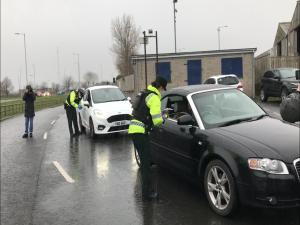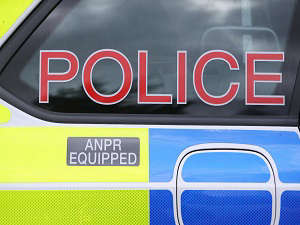
By Q Radio News
Police have launched this year’s winter anti-drink and drug drive operation, with a range of safety and protection measures in place to take into account Covid 19.
Head of Roads Policing, Chief Inspector Diane Pennington explained: “While we appreciate that many people may question the necessity of this operation, given the ongoing temporary closure of the hospitality industry and people curtailing their social lives. However the stark reality is that police are still detecting people drink and drug driving on a daily basis across Northern Ireland.
“Between 23 March and 18 May this year for example, despite a significant reduction in road traffic during the lockdown period, our preliminary figures indicate that we still detected 383 people drink driving, compared to 469 detections during the same time period in 2019.
“Last year during our winter anti-drink and drug drive operation; we carried out just over 16,000 roadside breath tests, and made 419 detections. Once again, over the coming weeks, targeted operations will run day and night, and we will coordinate road safety operations in border counties with colleagues from An Garda Síochána Traffic Corp.
“Road policing officers, local and neighbourhood policing teams will be working alongside TSG units across the country, using authorised vehicle checkpoints as a very visible, physical deterrent.
Chief Inspector Pennington went on to explain the additional safety protocols in place to protect motorists and officers during the operation, which runs from 4 December through to 4 January: “Before and after each use, every handheld breathalyser is sanitised, and officers wearing PPE will attach a new sealed disposable straw before asking the driver to perform the test.
“Once the test is completed, the driver can either take the straw, or leave it on the machine to be disposed of. We will also have facilities available if any drivers present with C19 symptoms, or indeed claim to have symptoms.
“I have no sympathy for any driver we detect who has made the decision to drive after drinking or taking drugs.
“My sympathy is with those families, friends and communities across Northern Ireland who are dealing with the death or serious injury of a loved one, because someone selfishly thought it acceptable to drive while under the influence. Whether that was after one drink, or getting behind the wheel the morning after.
“If you take the unacceptable risk of driving after drinking or taking drugs, you can expect to be detected by police. You can expect to be prosecuted and lose your driving licence. If you cause a collision in which someone is killed or seriously injured, you can expect a custodial sentence.
“The stark reality is that so far this year, 54 families across Northern Ireland are coping with the death of loved one because of a road traffic collision. Many others are recovering from serious and life changing injuries. As a result, there are drivers having to face the fact that their actions have caused a fatal collision.”
“It’s disappointing that despite our repeated and well publicised warnings, a minority of people continue to disregard the safety of themselves and others by taking the shameful and incredibly dangerous risk of driving after drinking or taking drugs.”
“Our message is very simple. Never EVER drink and drive. Just one drink can impair decision making. Just one drink can cause a collision. Just one drink could kill.”
“In addition to our authorised checkpoints, every driver or motorcyclist stopped by police, whether for speeding, using a mobile phone, or committing any moving traffic offence can expect to be breathalysed. Anyone involved in a collision or who we suspect may have consumed alcohol or taken drugs will also be tested.
“I appreciate this is a very different festive period for all of us. We all share the roads, so we all share the responsibility for road safety and we all share the responsibility to do everything we can to alleviate the pressure on our health service. Slow down. Never drive after drinking or taking drugs. Pay greater attention to your surroundings, and always wear your seat belt. If everyone follows this advice, then together we can save lives on our roads.”


 Police investigating Arson Attack in North Belfast
Police investigating Arson Attack in North Belfast
 McIlroy honours omission came despite Stormont nomination
McIlroy honours omission came despite Stormont nomination
 Police seize ‘significant quantity’ of drugs following chase
Police seize ‘significant quantity’ of drugs following chase
 Woman dies in hospital after road crash in Co Fermanagh
Woman dies in hospital after road crash in Co Fermanagh